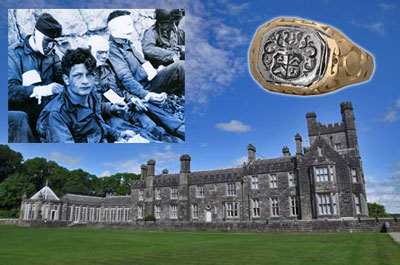
Today I took the bus to Parnham to give the ring to Carrington. I’d been putting it off since I’d returned, and honestly wish I hadn’t been so quick to promise I’d do it. I didn’t even know who Carrington was, or indeed which Carrington, should there happen to be more than one. And I had no idea where to look for him once I got to Parnham.
As I was jostled around on the bus, I started to worry about how he would react. I hoped he wasn’t dangerous, as you can never tell. What ridiculous situations this wretched war had put us in! I’d been so worried I’d mess it all up somehow. What had I been thinking, agreeing to it at all?
I changed buses at Litchfield, heading out to Parnham, and found myself seated next to an extremely chatty lady. This was a terrific stroke of luck, as I asked if she knew where Carrington lived.
“Why, didn’t you know? He lives in Parnham House. Viscount Carrington, if you please,” she joked, putting on a posh accent.
“Oh, I didn’t know,” I said, not finding it the least bit funny. That’s all I needed: a viscount. “Is he a young man?”
“No, but there’s two sons. The eldest is away with the RAF, bit of a toff, if you know what I mean. And then there’s the younger one, leg wounded in France, at home recuperating. He’s a nice lad. Doesn’t seem to get on with the Viscount, though.”
“Oh, why’s that?”
“The Viscount is very proud and traditional,” she sniffed. “Don’t like the way the boy hangs about. If you ask me, he can’t stand the sight of him.” She pursed her lips, nodding in a most disparaging manner. “We hear things from the servants, you know. It’s a shame the lady passed away last year.” She paused, waiting for me to enquire further, and then, when I didn’t, added, “It was the tuberculosis, you know.”
The house was a short walk from the village, and I found my feet dragging. My meetings with aristocracy had been mercifully few and far between. They may not have had the authority they once did, but they still sent a wave of panic through me. If only I had been Mrs. B. with her indefatigable self-confidence — although I very much doubt Mrs. B. would have agreed to this undertaking, especially since it involves something illegal. Heaven help poor Carrington, as she would march him down to Parnham Police Station within the hour, viscount or no viscount.
I was also incredibly nervous that my task was not straightforward. Which son was I supposed to tell? What if the Viscount was the only one there and insisted on knowing my errand? What was I to say?
As it happened, I wasn’t left in trepidation for long. The antiquated footman who greeted me informed me pompously that the Viscount was not expected home for another half hour.
“I’ve come to see his son,” I said quickly.
“I shall enquire within,” he said snootily, and showed me into a chilly drawing room.
The house was one of those massive old mansions, terribly grand and austere but empty looking and all rather dismal. The faded colors — sage green, dove blue — had become gray with age, and I knew for a certainty that if I saw a duster lying around, I wouldn’t have been able to help myself. The smell of wax polish and antique mothballs added to the starchy gloom. I felt completely alien and distinctly uncomfortable.
The door presently opened, and a young man entered. Thank goodness: I knew straightaway that he was the one, although I have no idea why or how. Perhaps I could imagine them together, him and Jarroby. They seemed similar, like they were two halves of a whole. He was medium-height, still slim from youth, and he walked with a self-conscious deliberation, steady, slow, ponderous. One of his legs was obviously wounded, his trouser leg bulking with bandages as he limped forward. And when he looked up at me, his eyes avoided mine, glancing out of the great terrace window, and then at the fireplace. He seemed so vulnerable. There was some deep discomfort in him, an estrangement from everything surrounding him.
“Hello,” I smiled warmly, suddenly conscious that my mission was about to bring me closer to this man than most of the people he knew. “I’m Mrs. Jennings, from Chilbury.”
“Do take a seat,” he said. His voice was upperclass, poised and deliberate. He didn’t return my smile, which I thought was both understandable and rude simultaneously — although, how was he to know my dreadful errand? I perched on the edge of a taut beige brocade settee.
He gently picked up a cushion before sitting down on a couch opposite, measuring every movement as to the effect on his leg. He sighed and looked out of the window again.
“What brings you to these parts, Mrs. Jennings?” he said, as if reading from an etiquette manual, exasperated by the need to deal with me.
“I have a message from Jarroby.”

